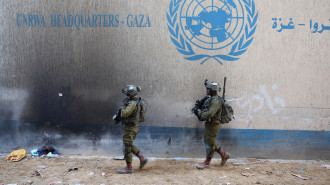What's behind recent Kurdish victories against Islamic State?
Kurdish forces in Iraq and Syria have emerged as some of the most effective forces in fighting the Islamic State (IS).
Iraq's Kurds, mainly the peshmerga, defended their autonomous region, gained control of a swathe of long-disputed territory during IS's sweeping offensive and retook areas they lost to the extremist group.
In neighbouring Syria, the Kurdish People's Protection Units (YPG) and allied Syrian forces, defended the town of Kobane against IS in a months-long battle, retook the strategic town of Tal Abyad on the Turkish border this month and fought IS in other areas.
Aided by US air cover, Kurdish units marching west from Kobane and others moving east from the Kurdish town of Ras al-Ayn linked up, encircling Tal Abyad from three sides and eventually capturing it in a remarkably short time.
With that, the Kurds connected three of their self-administered cantons along the border with Turkey (Kobane, Tal Abyad, and Ras al-Ayn), putting even more pressure on IS-held Raqqa.
But the role of the US-led air support in the success of Kurdish forces in both countries is largely underestimated.
US-led airstrikes against IS have been focusing on Kurdish fronts, paving the way for the Kurds to advance, while largely leaving the Syrian rebel groups exposed to IS in Aleppo.
Decisive airstrikes shaping battles
On Friday, the Free Syrian Army units fighting alongside the Kurdish forces in the northeast had to retreat from the town of Ayn Issa, south of Tal Abyad, because of the lack of air support against IS.
This retreat reveals an inconvenient truth about the war against IS: it is practically implausible to keep back IS fighters without air support. The strategy of US airstrikes has shaped the geography of war. Battlefronts have been started and ended because of heavy airstrikes or lack thereof.
In Aleppo, the Syrian rebel groups coalition, Jaysh al-Fateh, has been resisting an IS offensive for weeks, calling for US airstrikes on extremist group. Last week, only two US airstrikes against IS were reported around Aleppo.
In Tal Abyad, when the Kurdish forces were advancing on IS, the US-led coalition carried out 23 airstrikes near the city over two weeks, according to a tally of airstrikes reported by the US military's Central Command.
|
— Not a spy (@finriswolf) June 15, 2015 " style="color:#fff;" class="twitter-post-link" target="_blank">Twitter Post
|
State interests and political motives
Kurds in Iraq and Syria have been at the mercy of state interests and Arab dictators throughout modern history of the Middle East. Their cause has been exploited and manipulated in regional and local power contests.
However, the collapse of Arab states, specifically in Iraq and Syria, gave the Kurds a chance to consolidate their efforts and sieze the opportunity to advance their cause for autonomy and recognition.
Last year, the president of Iraqi Kurdistan, Massoud Barzani, rejected an invitation by US President until the US removed the Kurdistan region's two main political parties from its terrorist blacklist.
A month ago, days before the Kurdish offensive on Tal Abyad began, Barzani visited President Obama in the White House to court a vital ally on the frontline. In a statement after their meeting, the White House said Obama "commended the bravery of the Kurdish Peshmerga (forces)".
| US-led airstrikes against IS have been focusing on Kurdish fronts, paving the way for the Kurds to advance, while largely leaving the Syrian rebel groups exposed to IS in Aleppo. |
But amid sensitivities over Kurdish self-rule, the White House did not allow the media to witness the meeting and said Obama "dropped by."
Despite that, American-Kurdish cooperation has been used by the White House as a bargaining tool with Baghdad and Ankara.
On one hand, the US pushed Iraq to adopt its military strategy against IS by pointing out to Kurdish success through cooperation with the US. As the Iraqi Prime Minister, Haidar al-Abadi, sways between Tehran and Washington, the US administration is using all cards to keep the Iraqi regime close.
On the other hand, the White House keeps Turkey, whose regional ambition worries the US, at bay by empowering the Kurds on its border with Syria and thus cutting Turkey's direct connection with the Syrian rebel groups.
In the midst of all that, the Kurdish leadership seems to understand the pragmatism of modern politics and the complex state interests at play in Syria and Iraq. Consequently, the Kurdish parties have been exceptionally successful, as non-state actors, in advancing their interests while acknowledging and securing the interests of regional and international states.

![Palestinians mourned the victims of an Israeli strike on Deir al-Balah [Getty]](/sites/default/files/styles/image_684x385/public/2024-11/GettyImages-2182362043.jpg?h=199d8c1f&itok=xSHZFbmc)


![The law could be enforced against teachers without prior notice [Getty]](/sites/default/files/styles/image_684x385/public/2178740715.jpeg?h=a5f2f23a&itok=hnqrCS4x)
 Follow the Middle East's top stories in English at The New Arab on Google News
Follow the Middle East's top stories in English at The New Arab on Google News


